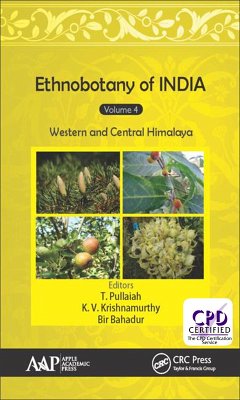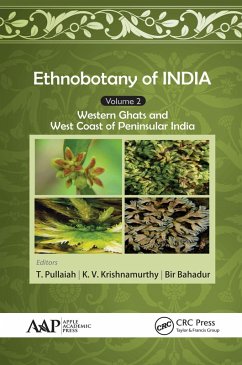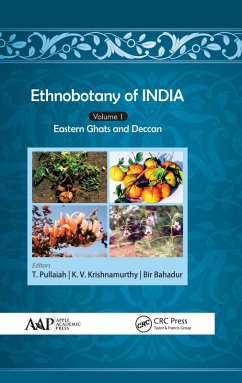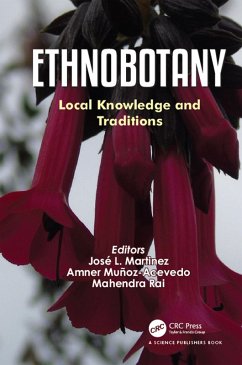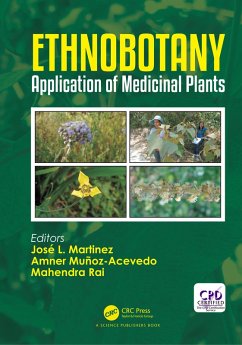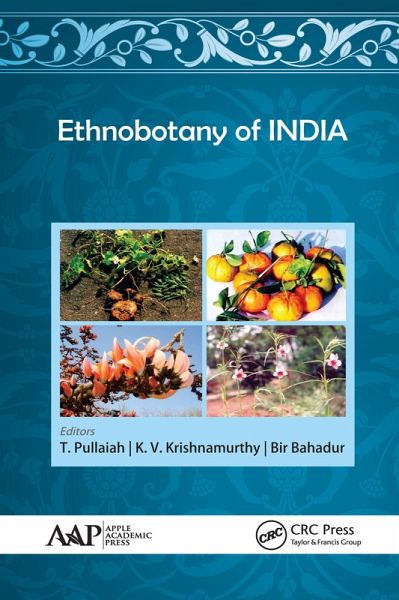
Ethnobotany of India, 5-Volume Set (eBook, PDF)

PAYBACK Punkte
312 °P sammeln!
This new 5-volume set, Ethnobotany of India, provides an informative overview of human-plant interrelationships in India, focusing on the regional plants and their medicinal properties and uses. Each volume focuses on a different significant region of India, includingVolume 1: Eastern Ghats and DeccanVolume 2: Western Ghats and West Coast of Peninsular IndiaVolume 3: North-East India and Andaman and Nicobar IslandsVolume 4: Western and Central HimalayaVolume 5: The Indo-Gangetic Region and Central IndiaWith chapters written by experts in the field, the book provides comprehensive information o...
This new 5-volume set, Ethnobotany of India, provides an informative overview of human-plant interrelationships in India, focusing on the regional plants and their medicinal properties and uses. Each volume focuses on a different significant region of India, including
Volume 1: Eastern Ghats and Deccan
Volume 2: Western Ghats and West Coast of Peninsular India
Volume 3: North-East India and Andaman and Nicobar Islands
Volume 4: Western and Central Himalaya
Volume 5: The Indo-Gangetic Region and Central India
With chapters written by experts in the field, the book provides comprehensive information on the tribals (the indigenous populations of the region) and knowledge on plants that grow around them. Each volume includes an introductory chapter with an overview of the region and then goes on to cover
The books include the details of the plants used, their scientific names, the parts used, and how the plants are used, providing the what, how, and why of plant usage. The volumes are well illustrated with over 100 color and 130 b/w illustrations.
Together, the five volumes in the Ethnobotany of India series bring together the available ethnobotanical knowledge of India in one place. India is one of the most important regions of the old world, and its ancient and culturally rich and diverse knowledge of ethnobotany will be valuable to many in the fields of botany and plant sciences, pharmacognosy and pharmacology, nutraceuticals, and others. The books also consider the threat to plant biodiversity imposed by environmental degradation, which impacts cultural diversity.
Volume 1: Eastern Ghats and Deccan
Volume 2: Western Ghats and West Coast of Peninsular India
Volume 3: North-East India and Andaman and Nicobar Islands
Volume 4: Western and Central Himalaya
Volume 5: The Indo-Gangetic Region and Central India
With chapters written by experts in the field, the book provides comprehensive information on the tribals (the indigenous populations of the region) and knowledge on plants that grow around them. Each volume includes an introductory chapter with an overview of the region and then goes on to cover
- ethnic diversity and culture of the ethnic tribes
- plants used for healing and medical purposes for humans and animals
- ethnic food plants and ethnic food preparation
- specific information on the ethnomedicinal plants, the parts used, and the diseases cured
- other uses of plants by the ethnic tribes, such as for fiber, dyes, flavor, and recreation
- conservation, documentation, and management efforts of the ethnic communities and their plant knowledge
The books include the details of the plants used, their scientific names, the parts used, and how the plants are used, providing the what, how, and why of plant usage. The volumes are well illustrated with over 100 color and 130 b/w illustrations.
Together, the five volumes in the Ethnobotany of India series bring together the available ethnobotanical knowledge of India in one place. India is one of the most important regions of the old world, and its ancient and culturally rich and diverse knowledge of ethnobotany will be valuable to many in the fields of botany and plant sciences, pharmacognosy and pharmacology, nutraceuticals, and others. The books also consider the threat to plant biodiversity imposed by environmental degradation, which impacts cultural diversity.
Dieser Download kann aus rechtlichen Gründen nur mit Rechnungsadresse in A, B, BG, CY, CZ, D, DK, EW, E, FIN, F, GR, HR, H, IRL, I, LT, L, LR, M, NL, PL, P, R, S, SLO, SK ausgeliefert werden.






